IT’S a day to drift on a wind that smells of salt and seaweed. The sun glares on distant fells where snow burns the eyes. For the first time this year ??? the first time in many, many months ??? it feels like spring. Things are changing, and it’s not just the seasons . . .
One of the advantages ??? or possibly disadvantages ??? of moving away from the place of your birth and returning infrequently is that you notice the changes. Change is gradual, and if you live with it then the change becomes subsumed in the everyday pattern of normality. But this change is big. And the sea is responsible.
I’m not alone on my walk today. I have a dog and a grandchild ??? THE grandchild. Taking a three-year-old girl on an adventure along the shoreline of a Lakeland estuary is an experience for both of us. She sees lots of new things ??? and I discover that my plans alter rapidly to suit her whims, moods, and sudden urges to disappear behind sand-dunes and blunder carelessly into pools. The Border collie, despite being a puppy and bursting with energy, is easier to control. So let me tell you about the sea.
When I was a child in the 1960s, in an outpost of Lancashire that is now part of Cumbria, the Duddon estuary was flanked by miles of golden sands and acres of pristine saltmarsh. There was so much sand that when the village of Askam-in-Furness was built in the 1860s ??? during the boom years of the haematite iron-mining and smelting industry ??? the villagers were nicknamed ???sand rats??? because the drifts would block backyards and even the main street. (I???m never sure whether to describe Askam ??? population 3,600 ??? as a large village or a small town. But I???ve just been thumbing through Dr JD Marshall???s Furness and the Industrial Revolution, where he describes it as an ???industrial colony???, and that sounds perfect to me)
In the 1880s, the Lancet medical journal published a report on notifiable diseases, citing Askam as a particularly nasty example of insanitary industrial housing because of the sand and the developers’ inability and lack of enthusiasm to deal with it. The drifting became less when the ironworks slagbanks were extended across the dunes. Nowadays, the notifiable diseases have gone. Most of the sand has gone too, I discover.
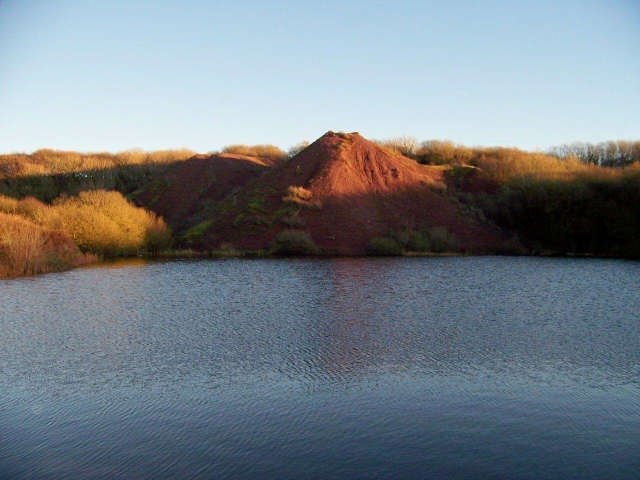
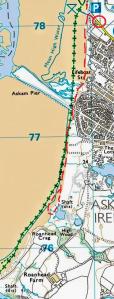 We walk to Blacks Pond, a flooded subsidence crater formed by the removal of haematite from the workings of the Woodhead Pit, which was situated right on the shoreline. Haematite formed in the underlying carboniferous limestone in huge bodies called sops ??? rather than veins or seams ??? so this part of the Furness peninsula is pock-marked by gigantic holes that have flooded and gradually been reclaimed by nature.
We walk to Blacks Pond, a flooded subsidence crater formed by the removal of haematite from the workings of the Woodhead Pit, which was situated right on the shoreline. Haematite formed in the underlying carboniferous limestone in huge bodies called sops ??? rather than veins or seams ??? so this part of the Furness peninsula is pock-marked by gigantic holes that have flooded and gradually been reclaimed by nature.
During the 19th Century, a seawall was built around the Woodhead Pit to prevent the Irish Sea entering the workings. The wall was still in pretty good condition during the 1960s, despite the pit ceasing production and the crater flooding before the First World War.
But now the wall has gone. It has been washed away by storms and shifting currents. The once-sandy beach has gone too ??? revealing a vast area of sticky mud that attracts Border collies and granddaughters. (By the way, you can click on pictures for high-res versions)
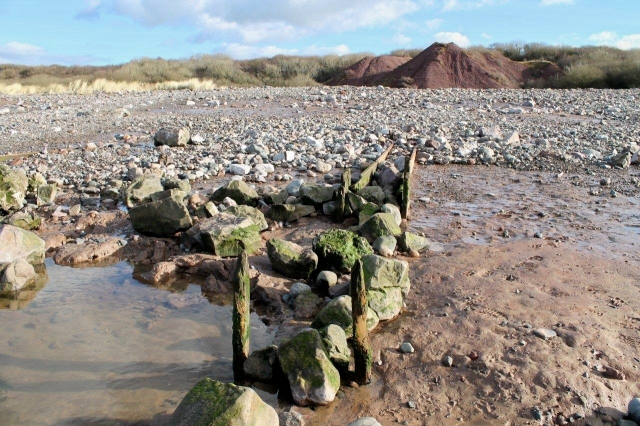 What has also been revealed is part of the pit’s pumping arrangements. The wooden flumes and a cast-iron pipe that delivered pit water to the sea have been uncovered by the tides. At one time, during the mine’s operation, they would have lain on the surface. Then shifting sands swallowed them and they remained swallowed for several generations. The timber flumes are in good condition, considering their age. Intriguingly, water pours from the pipe. Are the pumps still working down at the pit bottom?
What has also been revealed is part of the pit’s pumping arrangements. The wooden flumes and a cast-iron pipe that delivered pit water to the sea have been uncovered by the tides. At one time, during the mine’s operation, they would have lain on the surface. Then shifting sands swallowed them and they remained swallowed for several generations. The timber flumes are in good condition, considering their age. Intriguingly, water pours from the pipe. Are the pumps still working down at the pit bottom?
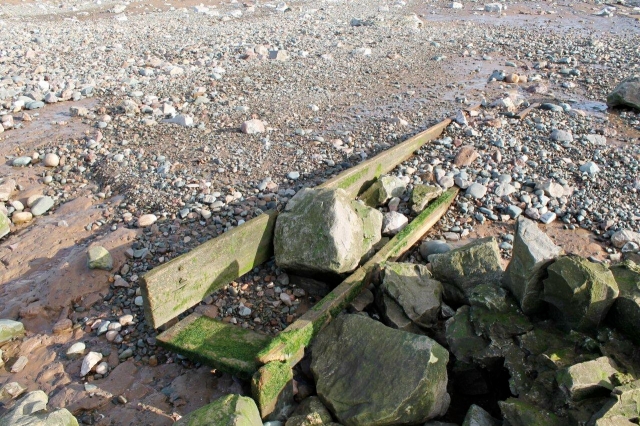
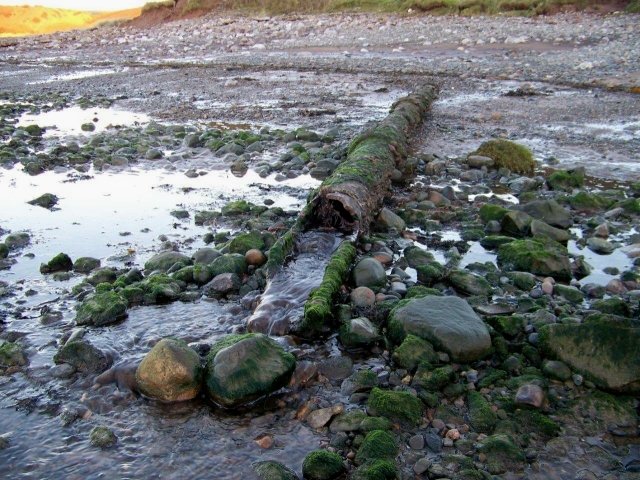
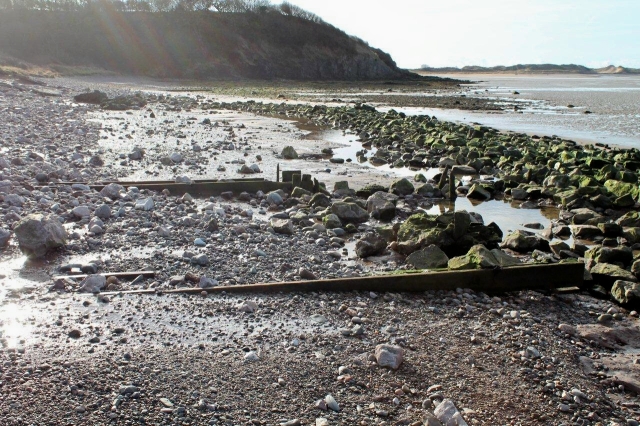 We head north ??? me, a wild dog and a wilder granddaughter. Huge sections of shore that were once beaches of perfect white sand are now sticky brown mud. We used to picnic down here and build sandcastles. Mud pies would be more appropriate these days.
We head north ??? me, a wild dog and a wilder granddaughter. Huge sections of shore that were once beaches of perfect white sand are now sticky brown mud. We used to picnic down here and build sandcastles. Mud pies would be more appropriate these days.
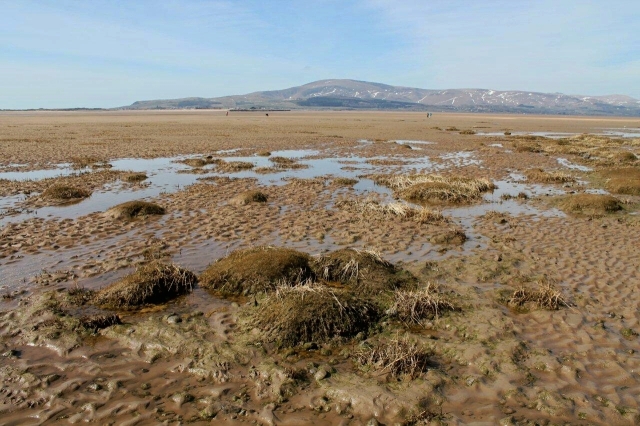
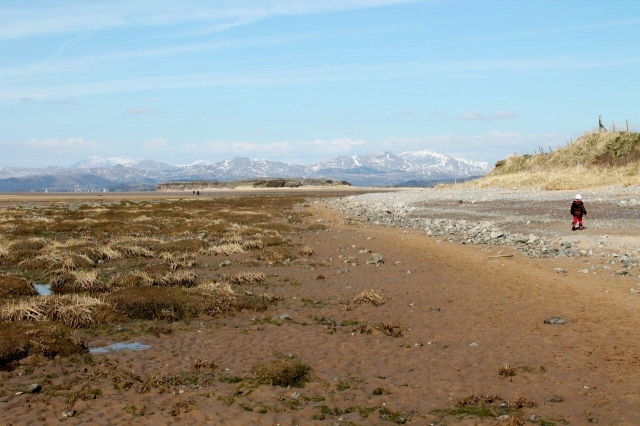 On the shoreline near Marsh Farm we discover a row of wooden stakes the sea has returned to the sunlit world. These, too, had been hidden in the sand for perhaps a century or more. In this area, at the dawning of the railway age, iron ore was loaded into boats from quays that have long disappeared. Are these stakes the remnants of that activity?
On the shoreline near Marsh Farm we discover a row of wooden stakes the sea has returned to the sunlit world. These, too, had been hidden in the sand for perhaps a century or more. In this area, at the dawning of the railway age, iron ore was loaded into boats from quays that have long disappeared. Are these stakes the remnants of that activity?
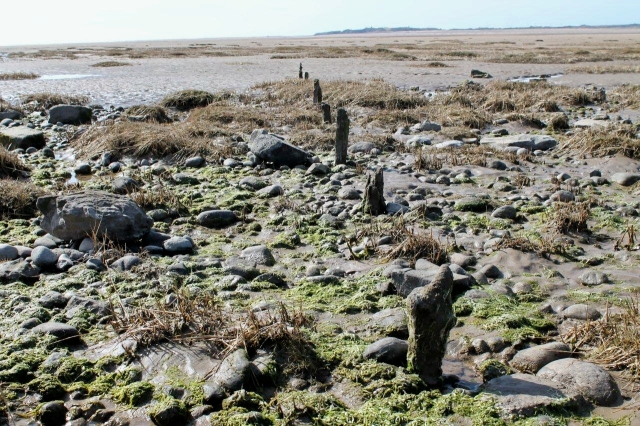 As well as the sticky mud there is rubble ??? the detritus of misguided attempts to halt coastal erosion during the 1960s. Builders??? waste was tipped by the wagonload along this part of shoreline. But with little regard for the efforts of man, the sea has picked it up and spread it like cinders. Bricks, concrete blocks and lumps of masonry have been worn smooth and aged by the sea. Fifty years from now they will have been pounded into pebbles. No? Let me tell you about the Germans.
As well as the sticky mud there is rubble ??? the detritus of misguided attempts to halt coastal erosion during the 1960s. Builders??? waste was tipped by the wagonload along this part of shoreline. But with little regard for the efforts of man, the sea has picked it up and spread it like cinders. Bricks, concrete blocks and lumps of masonry have been worn smooth and aged by the sea. Fifty years from now they will have been pounded into pebbles. No? Let me tell you about the Germans.
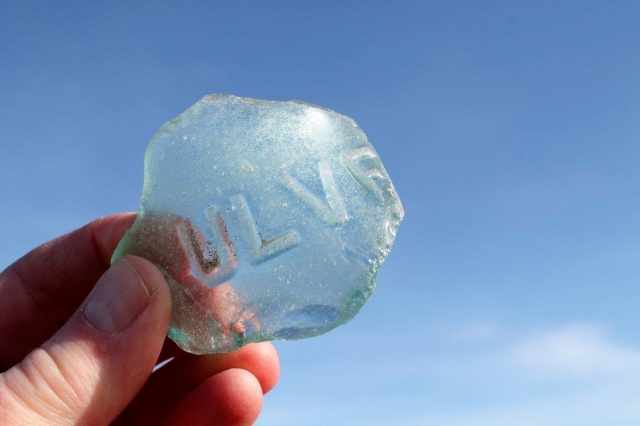
A piece of a beer bottle ??? probably Victorian ??? washed smooth by the sea. At a guess I’d say this formed part of a bottle embossed with “Hartley’s of Ulverston”, a local brewery, the name of which still survives
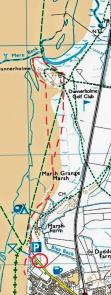 Between Marsh Farm and an outcrop of carboniferous limestone known as Dunnerholme lies a broad expanse of estuary that remains mainly sand. During the Second World War, concrete posts were positioned at intervals of twenty or thirty yards across the sands to prevent an airborne invasion by Nazi forces. Aeroplanes and gliders would have had their wings and undercarriage smashed if an attempt was made. A crude idea, but cheap and effective.
Between Marsh Farm and an outcrop of carboniferous limestone known as Dunnerholme lies a broad expanse of estuary that remains mainly sand. During the Second World War, concrete posts were positioned at intervals of twenty or thirty yards across the sands to prevent an airborne invasion by Nazi forces. Aeroplanes and gliders would have had their wings and undercarriage smashed if an attempt was made. A crude idea, but cheap and effective.
I remember the posts as a child, sticking from the sand about 6ft tall and with cores of rusty cast-iron ??? dozens of them, spread across the sands as far as the eye can see. But now they have gone. Only a few stumps remain. Soon they will have been erased from the physical world ??? and probably from memory.
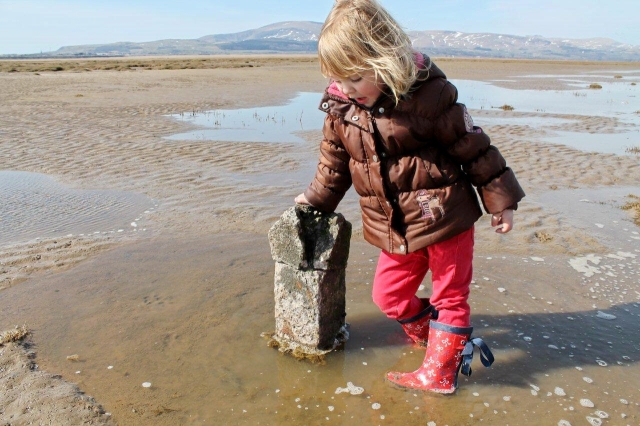
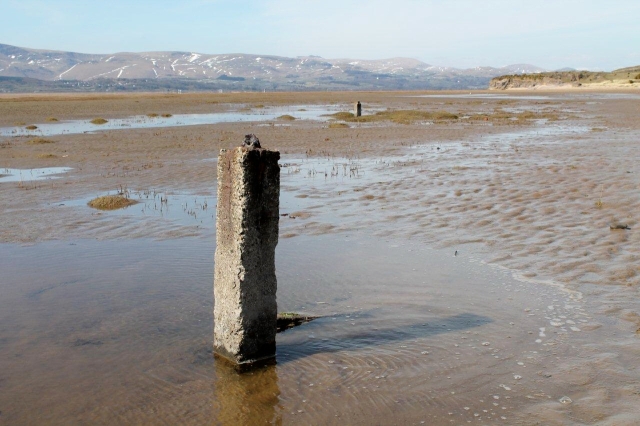
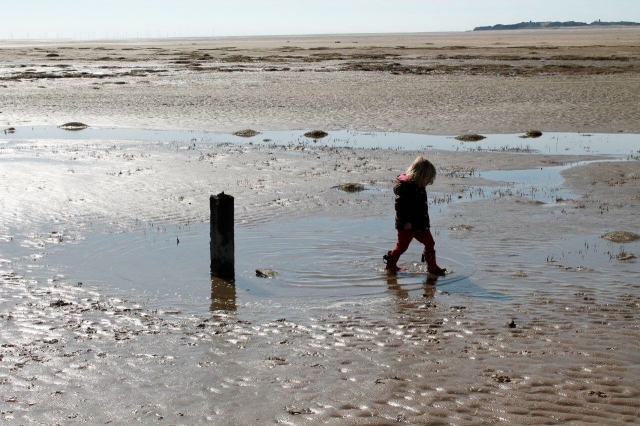 We wander on. The granddaughter is beginning to tire and get grumpy, but new shells, coloured stones and placid pools revive her interest periodically. At Dunnerholme, which is almost ??? but not quite ??? and island, she removes her wellies and fills them with lily sand. This keeps her occupied while I sit on a rock and contemplate the slow but unstoppable changes gradually remoulding this stretch of England.
We wander on. The granddaughter is beginning to tire and get grumpy, but new shells, coloured stones and placid pools revive her interest periodically. At Dunnerholme, which is almost ??? but not quite ??? and island, she removes her wellies and fills them with lily sand. This keeps her occupied while I sit on a rock and contemplate the slow but unstoppable changes gradually remoulding this stretch of England.
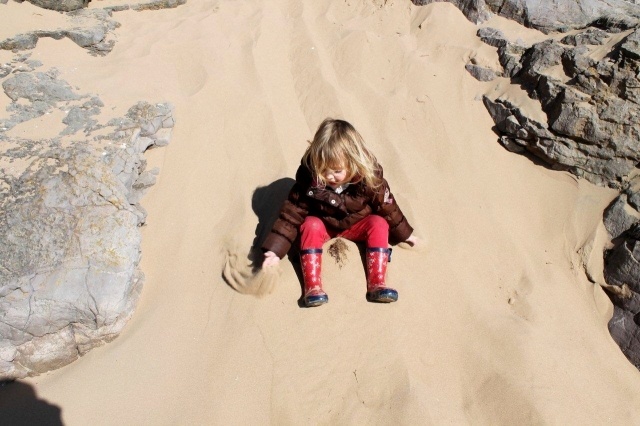 Lily sand. Has anyone come across that term, because I can???t find any reference on the internet? It???s the white sand that blows along beaches like smoke on a wind and forms into drifts; the sand that runs through your fingers and fills little pairs of wellies. On a breezy day it can get in your hair and sometimes your eyes. That???s lily sand.
Lily sand. Has anyone come across that term, because I can???t find any reference on the internet? It???s the white sand that blows along beaches like smoke on a wind and forms into drifts; the sand that runs through your fingers and fills little pairs of wellies. On a breezy day it can get in your hair and sometimes your eyes. That???s lily sand.
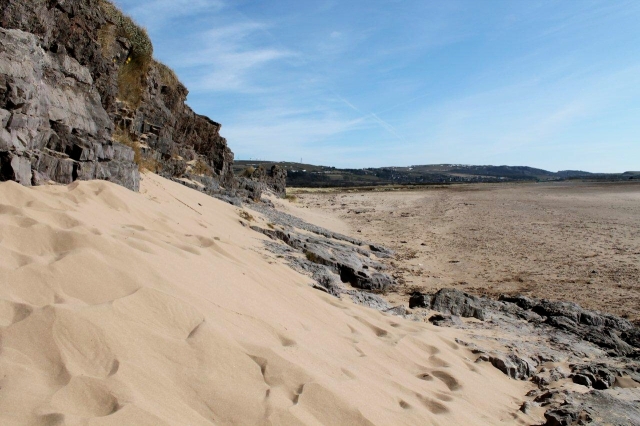
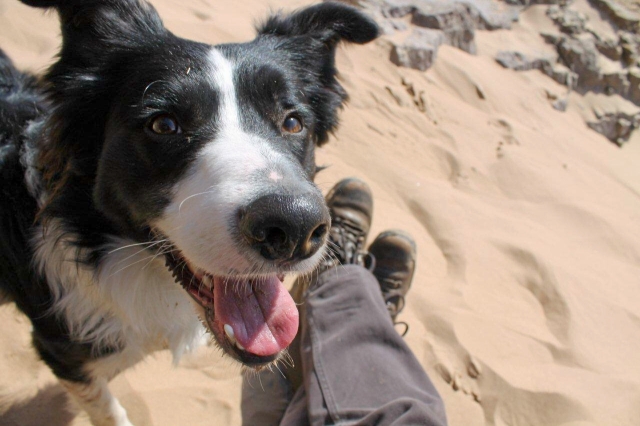
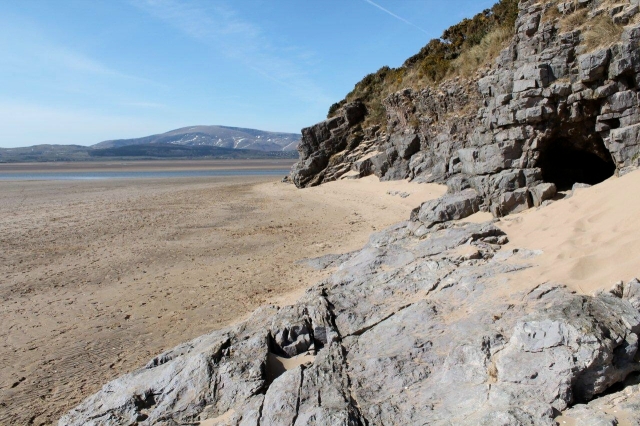
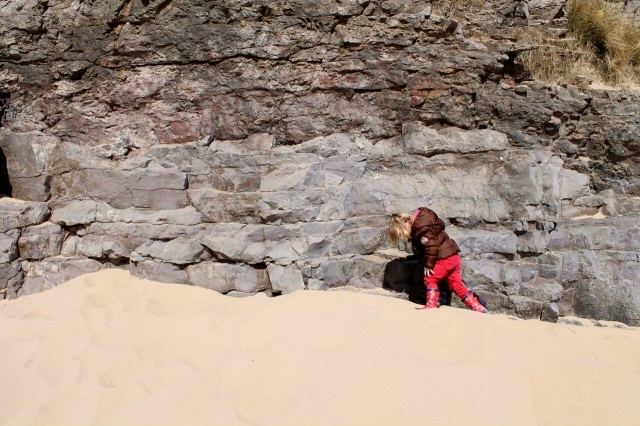 The biggest change, though, and a daunting and unsettling one, is the course of the Duddon itself. Thirty years ago, when the tide was low, the river channel lay in the middle of the estuary, a good ten or fifteen minutes??? walk across the sands. It was broad and it was shallow, and quite easy to cross.
The biggest change, though, and a daunting and unsettling one, is the course of the Duddon itself. Thirty years ago, when the tide was low, the river channel lay in the middle of the estuary, a good ten or fifteen minutes??? walk across the sands. It was broad and it was shallow, and quite easy to cross.
The river has moved, and the move is dramatic. Wordsworth???s Duddon has carved a gash that washes against the hitherto unseen foundations of Dunnerholme. It looks deep and cold. I won???t be going for a paddle today.
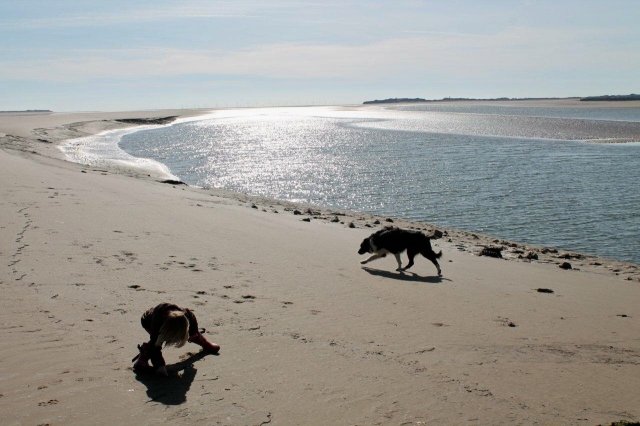
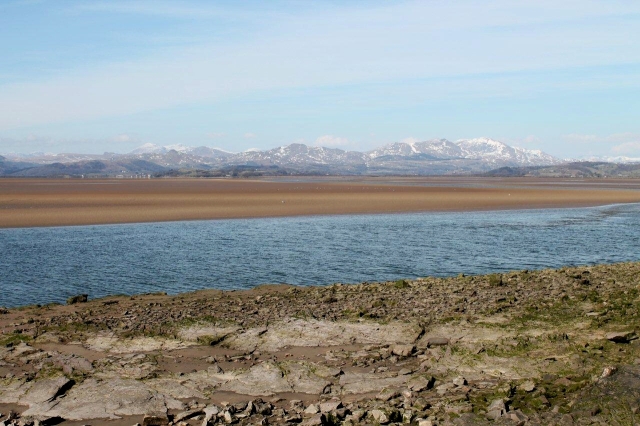
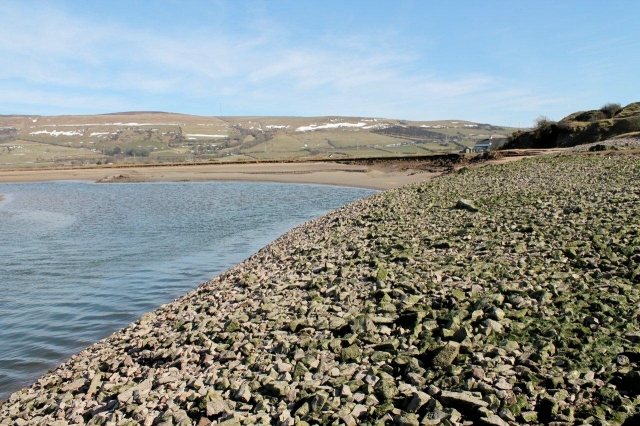
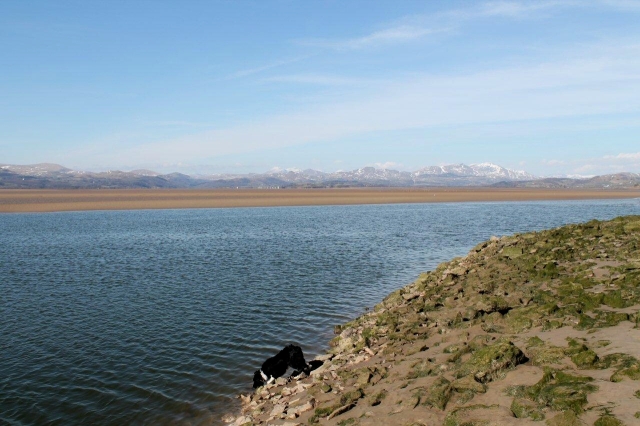
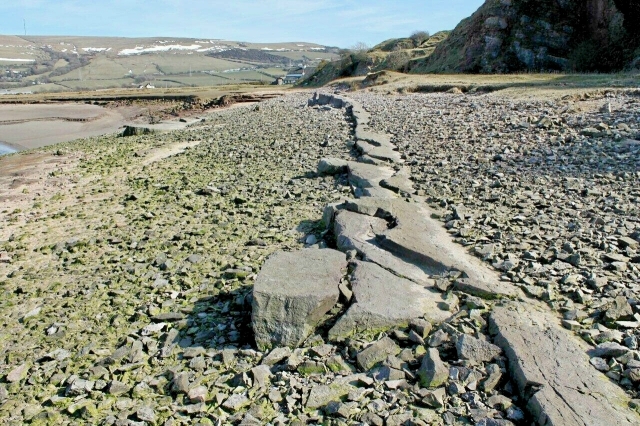 We pass the whitewashed Dunnerholme Cottages and chat to a bloke gathering litter from the tideline. He invites us in for a cup of tea, and we sit in his kitchen talking about mines, limestone kilns, railways and local history. He???s Canadian and his name is Graham. He tells me he moved to the Furness peninsula in 1986, stumbled on Dunnerholme by chance, and bought one of the cottages with its single tap, slate-flag floor, clunky floorboards and dramatic location on the edge of the sea with uninterrupted views of the Lakeland fells.
We pass the whitewashed Dunnerholme Cottages and chat to a bloke gathering litter from the tideline. He invites us in for a cup of tea, and we sit in his kitchen talking about mines, limestone kilns, railways and local history. He???s Canadian and his name is Graham. He tells me he moved to the Furness peninsula in 1986, stumbled on Dunnerholme by chance, and bought one of the cottages with its single tap, slate-flag floor, clunky floorboards and dramatic location on the edge of the sea with uninterrupted views of the Lakeland fells.
The sea has been in once, he tells me, flooding the ground floor. Other than that, there???s an unmade track, an unmanned level-crossing with gates you have to open yourself, and a twisting farm road before you encounter that overrated comfort-blanket we refer to as the civilised world. If it sounds like heaven, it???s because it is.
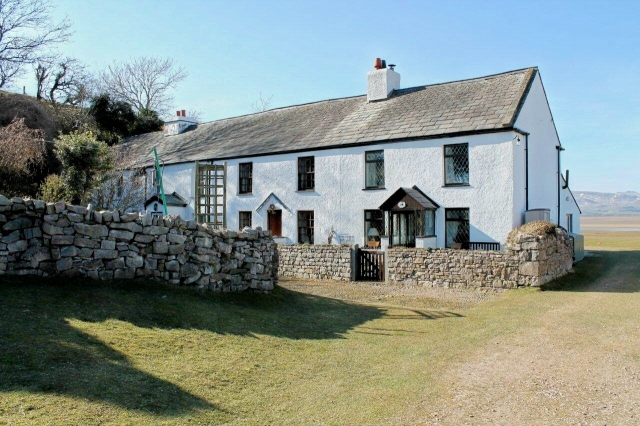 We talk about the Duddon channel changing its course. He tells me the local farmer, who has lived for 80 years at Marsh Grange, just across the fields, has never seen it alter so much in the space of a year. Apparently, it???s washed away a sizeable area of saltmarsh in its meanderings. Food for thought. We sup our tea. The dog whines and strains at its lead. The granddaughter eats a banana.
We talk about the Duddon channel changing its course. He tells me the local farmer, who has lived for 80 years at Marsh Grange, just across the fields, has never seen it alter so much in the space of a year. Apparently, it???s washed away a sizeable area of saltmarsh in its meanderings. Food for thought. We sup our tea. The dog whines and strains at its lead. The granddaughter eats a banana.
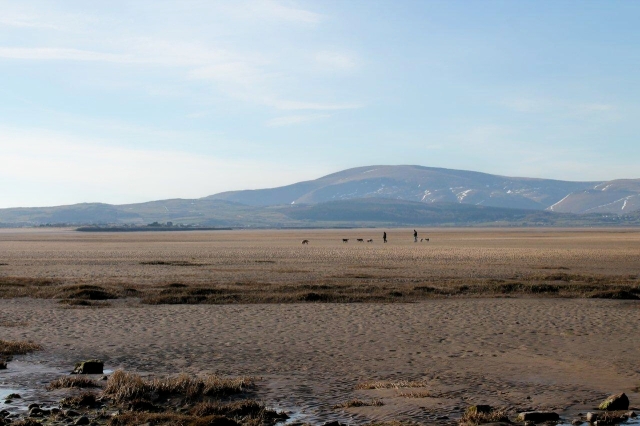 Then we all shuffle off in the direction of Askam, an industrial colony once choked with sand ??? me, a wet dog, a weary grandchild sitting on my shoulders, and Graham accompanying us for part of the way, resuming his litter-pick on a shore that???s forever changing.
Then we all shuffle off in the direction of Askam, an industrial colony once choked with sand ??? me, a wet dog, a weary grandchild sitting on my shoulders, and Graham accompanying us for part of the way, resuming his litter-pick on a shore that???s forever changing.

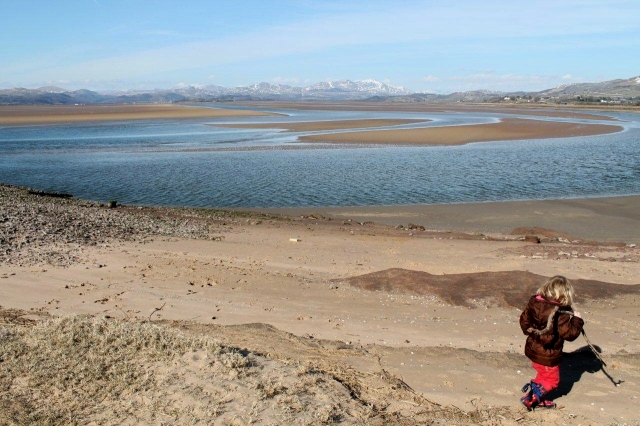
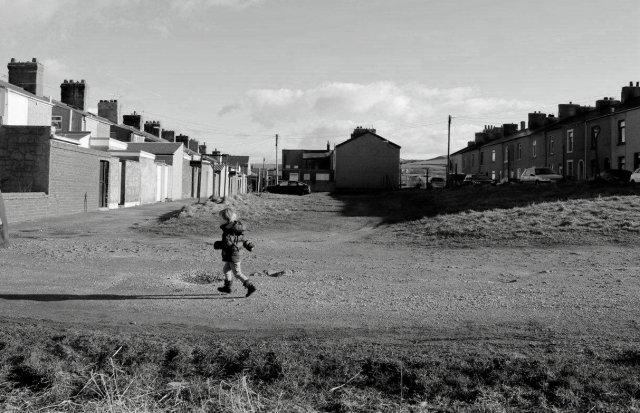
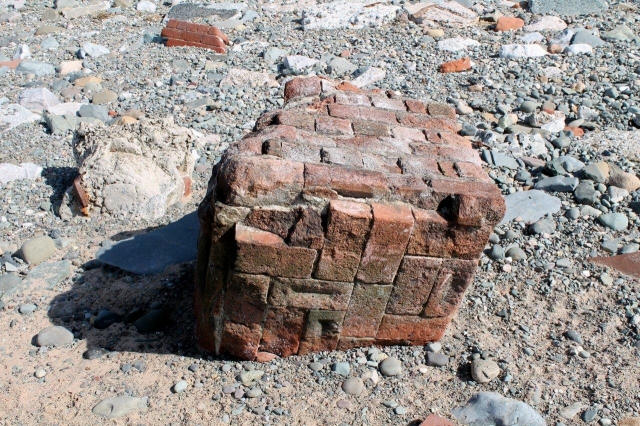
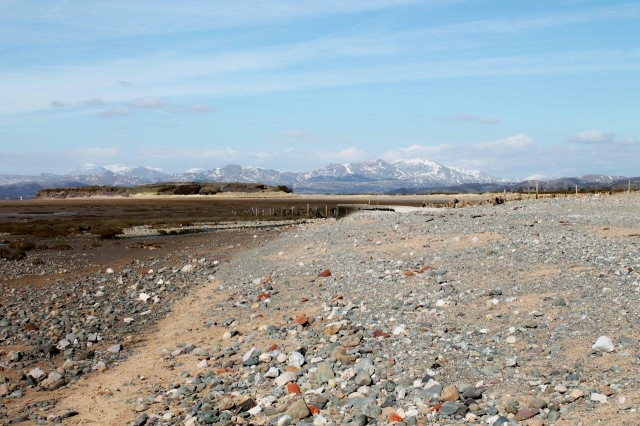
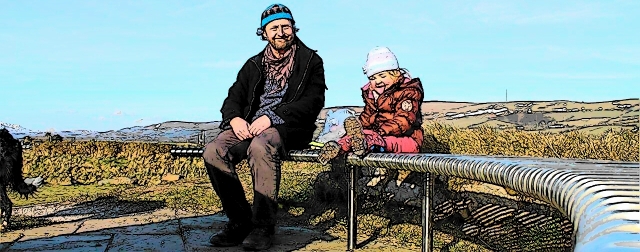










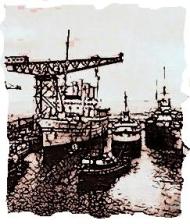
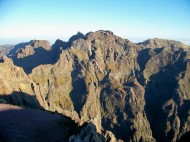
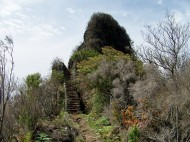
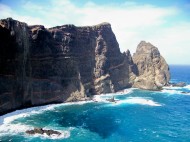
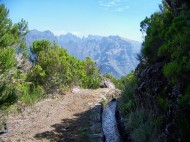
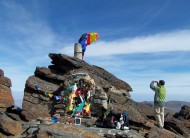

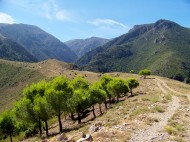
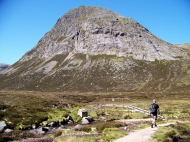
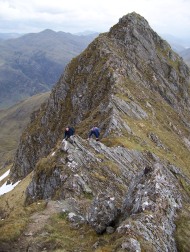
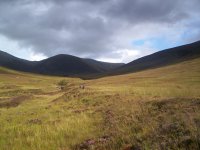

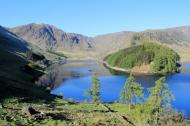
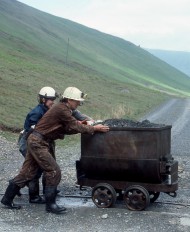
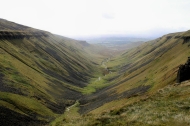

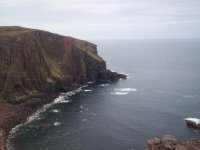
A wonderful blog.
I have never visited this particular part of England but am now tempted to go.
And I love your granddaughters wellies
David
Hi David. As the crow flies, it’s not all that far from Belfast. In fact, on a clear day it’s possible to see the Mourne mountains from the local hills. And the granddaughter has more wellies than Imelda Marcos has shoes.
Cheers, Alen
I have to say that, in my keenness to get up the hills, I generally neglect the Cumbrian Coastline – I can see that’s a pity. Maybe when I get older I’ll slow down and take a wander along the beach instead. Whenever I do visit a beach though, I always have a paddle – no matter how cold it is. I think I believe that seawater is good for the legs – I’m almost sure I’ve heard some people paddle racehorses in the sea in some areas for the sake of their legs.
If paddling in seawater is good for your legs and stops you slowing down then I’m going to try it, Carol. But if that leads to taking a plunge in the sea on New Year’s Day, like lots of people do, I’m drawing a line before that stage.
I’ve seen racehorses in the sea at Redcar, so there’s probably something in it.
Cheers, Alen
Just stick to the lower legs – that’s usually bearable ;-)
A truly wonderful read on the ever changing Duddon estuary.
Hope you all got back in one piece Alan despite some possible sore shoulders there, it looks as if your grand daughter had a great time & no doubt ‘slept that night’
A great meet & chat with Graham with some old stories that you both shared to boot, a great day & a great read as always…
Incidentally, there are Pill Boxes along sections of the Leeds & Liverpool canal close to where I live here in Lancashire, put in place to stop the Germans sailing inland from the Liverpool coastline under cover no doubt… I would love to of seen the face of a German sailor come face to face with a Lancashire bargeman.
Hi Paul. Thanks for that. She did sleep that night, but she was up at 7am the next morning, which is a bit on the early side for me.
That’s interesting about the Leeds and Liverpool Canal. I had big plans to walk the whole length of it at one time, starting at Leeds and ending at the docks in Liverpool, but like lots of big plans it got put on a back-burner and forgotten about.
You see pill-boxes in some odd places. There used to be one on the A590 near Newby Bridge that was covered in garden gnomes. I have no idea why it was put there but the gnomes seemed to like it.
Cheers, Alen
It looks you had a smashing family day out Alen. I don’t know the western coastline well at all, but I am slowly getting to know bits of it. I spent last weekend not too far away walking in the Silverdale/Arnside area, so am getting a bit closer.
Hi David. I’ve been through Silverdale and Arnside hundreds of times on the train but never actually done any walking there. But I once spent an afternoon crawling about in some very dirty iron ore mines beneath Warton Crag, about two miles to the south-east of Silverdale.
Hope you took lots of pictures. I shall keep an eye open for them.
Cheers, Alen
I love the view from the sea to the mountains, white peaks. It is a unique landscape.
It can only instill respect when you see how the sea gets landscapes to change character.
The last picture is very beautiful and cozy, and The Grand Child looks extremely happy.
The dog puppy lacks a little enthusiasm in terms to become pictured.
It’s an exciting story and lovely evocative images, Alen.
All the best,
Hanna
Hej Hanna. Thank you for your comment. The sea demands a great deal of respect. On a calm day such as that it looks friendly and benign, but when storms roll in from the Irish Sea it can be a dangerous place. Many people have perished on the Duddon sands.
I have reached the conclusion, after many attempts, that it is impossible to capture a dog, a grandchild and myself on the same picture when using the camera automatically. It’s just one of those things.
All the best, Alen
A good talk and a good walk. Taking the wee ones out in nature is something that helps to shape them and they will remember forever Grandpa.
You’re right, Dohn. It’s good to watch them seeing and learning from the things they can touch and smell.
Cheers, Alen
Alen,
I have recently found your blog and have enjoyed so many of the entries.
We live over towards Millom and our village is even on some of your photos. Here is a piece of local journalism which may interest you and shows that things may not change that much – at least in Millom …
Many thanks,
Jon
The Whitehaven News – Thursday, August 25, 1904
DROWNED ON THE DUDDON SANDS.
FOOLHARDY ESCAPADE OF A MILLOM MAN.
THE STATIONMASTER SEES THE MAN GO UNDER WATER, BUT CAN GET NO ASSISTANCE IN TIME.
On Tuesday evening an inquest was held before MR. POOLE (coroner) respecting the death of ALBERT WALKER of Millom. MR. COULTON was foreman of the jury.
WILLIAM HILL, Newton-street, Millom, said he knew ARTHUR WALKER, of 127, Newton-street, who was a mason’s labourer, aged 21 years. On Saturday last he and the deceased left Millom by the 3.18 train. When they got to Kirkby they went to the Railway Inn, and had beer, but he could not say how much the deceased had. Witness had a couple of pints, but the deceased had more. They afterwards had some more drink, witness having a small rum.
THE CORONER: Had you any drink before you came from Millom?
I had none.
Was witness under the influence of drink?
Yes.
You spent all the time at public-houses in Kirkby, and evidently came here to get drunk?
No.
Where did you last see WALKER ?
At the station.
At what time?
Just before the six o’clock train.
Well, did you miss the man or what?
No.
Did you catch the train.
Yes.
What train?
The quarter past six.
Where did you leave WALKER?
At the station.
Why?
Because he would not come.
Why would he not go?
Because he said he was going to go across the sands.
Were you drunk at all?
No.
Well, he was drunk?
Yes.
Why did you leave him?
Because he would not come.
You knew what condition he was in, and you ought to know that he was not fit to cross the sands?
I tried to keep him back, but it was no use. He shoved me back.
All the greater reason you should have followed him. Whereabouts was he going ?
Going across the marsh from the station.
EDWARD PARK FOX, stationmaster at Kirkby, stated that the deceased first came under his notice about five o’clock, when he came onto the down platform. He was helplessly drunk, and the up platform was crowded with passengers for the 5.18 train. Witness got him into the waiting room, and tried to keep him there till the train went. He would not wait, and two of his companions took hold of his arm and brought him across the level crossing, and in going down the platform he was staggering, and nearly knocked a lady down.
Witness lost sight of him for about fifteen minutes, and when he came back he was staggering in front of the station. Witness went and took hold of him by the shoulder, and asked him to lie down and have a sleep.
He made some remark about being able to get over the sands, and witness said he could not as he was not in a fit state. At that time witness was called away and five or ten minutes after he came to look for the deceased, he made inquiries and was told that he had gone on the marsh. He had then got on the sands, and had made his way across the Pool. He was on the green and was staggering along, making in the direction of Millom Station.
He then went to his companion named HILL, and drew his attention to his mate going across the sands, and pointed out the dangerous position he was in. The reply he got was one of indifference – he did not care, or something of that sort.
There was a large crowd on the platform waiting for the 6.16 train, and when he mentioned the matter, some ridiculed the idea of being drowned, and said if he got in the water he would soon be wakened up.
He watched the deceased at intervals through a field glass. He saw him walking and splashing through the water, which he did not think ever got above his knees. He staggered along, and after awhile he could not see him, and he felt sure he had gone under water.
Witness shouted this out, and three young fellows named COULTON, STONES, and EDGAR, went towards him, but when they came back they said when they got to the place where he was last seen, they could see nothing of him.
Just previous to this, witness sent for the police. On account of the crowd that was on the platform, he could not get any of his men to assist until after 6.16, and by that time the man was drowned.
THE CORONER: Do you know if there was any deep place in the direction in which he was going?
I don’t know anything about the depths of the sands across there, but I suppose it is full of holes, and the tide was in.
He could not get across then?
No, if he had even been sober he could not.
Not in a state to hardly know what he was doing?
I don’t think he knew what he was doing. He seemed to be stupid.
Was there anyone you could have got to **** at the time?
There was no one. There was extraordinary traffic. Something like 400 people on both crossings. The platform was crowded with people, mostly from Millom.
Mostly in the same condition as the deceased was in?
Some were under the influence of drink, but I cannot complain about them generally.
GEO. FELL said he found the deceased about five o’clock on Sunday morning on the Duddon Sands.
THE CORONER: Do you know if there was a hole near the place where deceased was found?
There was a break about a yard high, about the place where the men said he had gone in.
I understand the tide was up?
Yes, it would be up.
THE CORONER in summing up, said: This gentleman is the second inquest I have held within the last ten days on Millom men who have gone out of their own district to get drunk. It seems that the deceased and the first witness came over to Kirkby, and they had been practically all the time in public-houses. They no doubt had a great deal of drink, but the other man that was with the deceased was probably not quite so bad as he was, otherwise he would hardly remember what he was doing.
Had he been sober, I would have something very different to say about him leaving his companion in the condition that he was in. Of course, the deceased had no knowledge of the dangers, or he would not have attempted to walk over the sands at any rate when there was a full tide.
They could only find the verdict “That the deceased was drowned whilst drunk in attempting to cross the sands.”
It was exceedingly sad to see the way people made beasts of themselves, and got drunk the way deceased and his companion did.
The jury found the verdict that “The deceased was drowned in crossing the Duddon Sands whilst under the influence of drink.”
Hi Jon. A sobering tale and a lesson to us all. I had a night out in Millom once, so I can see what you mean. My one stark memory is of a Grolch bottle sailing rainbow-like through the disco lights in the nightclub (I forget the name of it) and crashing against a wall.
Poor old Albert Walker. He certainly wasn???t the first person to meet his death out there in the Duddon estuary the worse for drink. And I bet there have been a few since then.
Indeed, about ten years ago I was staying with friends who have a house just up from Green Road station and we went for a night out in the Prince of Wales at Foxfield with the intention of catching the late bus back. We were rather drunk because there was a beer festival in the pub, and when the bus didn???t materialise we actually considered walking along the railway line across the viaduct and along the side of the estuary. It???s not the same as crossing the sands but it???s still a pretty foolhardy thing to contemplate.
In the event, the bus turned up about half an hour late and delivered us safely to Green Road. But looking back, instances like that make you think. Albert Walker probably weighed things up in his befuddled mind but took the wrong decision.
Thanks for the press cutting. Kirkby certainly sounds like it was a lively place in those days.
Cheers, Alen